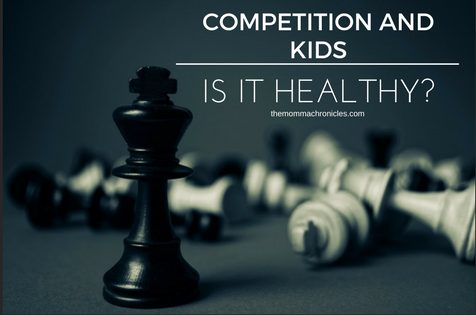I am tasked to pick up my daughter everyday after school and one time, our conversation went like this:
L: Mommy, S (her classmate) is the winner in the Spelling Contest. I don’t like. I want to be the winner.
Me: That’s okay. There’s always next time.
L: No, I want to be the winner. Uhm, mommy, can we practice later so I can be the winner?
Yes, we practiced when we got home. We did our CVC review and asked her to spell simple words so that she will be ready on the next Spelling Contest in school.
The truth is, this is just one of the many instances when my daughter showed her competitiveness. At first, I didn’t mind because she was exhibiting good study habits and was motivated to do better (although she went to a progressive school so there is really no grading system). You can always see her burying herself in her workbooks or reading a book. She enjoys learning new things, so we always introduce a new concept to her.
On the other hand, her being competitive is driving me nuts. Even in little things like who takes a bath first or who woke up first in the morning is a competition for her. There was even an instance when we were jogging around and she got frustrated when her sister went first. Worse, she even looks at her sister as a competition and doesn’t like the feeling of being behind her.
Here comes the big question: Is competition healthy for kids? More importantly, how do we foster healthy competition?  What Experts Say
What Experts Say
Many child development experts will say that competition, as long as it is healthy, can be good for kids. In fact, competition sets forth the following benefits:
- Prepares them for something bigger later in their lives such as finding a job, getting promoted, or even as simple as acing a test.
- Teaches them important skills like tenacity and developing empathy among others
- The social skills kids gain from competition helps them improve their interaction with other people while learning the value of hard work.
- Develops a child’s problem-solving skills, which can also be beneficial in later life.
- Teaches the kids that those who work hard will be more successful than smartest or brightest.
- Sets your child to be a team player.
What if the child loses? How should parents deal with it to avoid crushing a child’s self-confidence? What can we do to eradicate the culture of “winners” and “losers?”  As parents, it is our duty to change our kids’ mindset about competition. Instead of teaching our kids that “s/he should be better and must triumph over the others” or the winning mindset, it is best to make them understand that being in a competition is not about getting ahead all the time but to be encouraging towards others. We should urge our kids to cheer and recognize the efforts of other people to foster cooperation and not just competition. Otherwise, we could be indirectly teaching our kids to do whatever it takes to win, even if it means resorting to unfair practices – and that is not good.
As parents, it is our duty to change our kids’ mindset about competition. Instead of teaching our kids that “s/he should be better and must triumph over the others” or the winning mindset, it is best to make them understand that being in a competition is not about getting ahead all the time but to be encouraging towards others. We should urge our kids to cheer and recognize the efforts of other people to foster cooperation and not just competition. Otherwise, we could be indirectly teaching our kids to do whatever it takes to win, even if it means resorting to unfair practices – and that is not good.
More than that, we, parents, must teach our kids that winning is just one aspect of competition. In fact, there is more to it – and to life – than just trophies, awards, or being first all the time. Despite losing, which normally happens in real life, what matters most is the lessons and experiences gained during the process. After all, failures and disappointments will always be part of life experiences and there is nothing wrong with that.
How to Encourage Healthy Competition in Kids
- Make our child understand that “winning” and “accomplishment” is about setting a goal s/he wants to achieve and working hard for it.
- Parents must be supportive and not the other way around. Surely, we want our kids to emerge victoriously, but putting pressure and expecting too much from what they are capable of are bad precedents and foster negative attitude towards competition.
- Remind our child that the toughest competitor is him/herself. Rather than focusing on why our child didn’t win the first time, use it as a motivation for him/her to do better the next time.
- Reinforce the message that losing is and will always be part of the process, and that’s okay.
- Acknowledge the child’s efforts, regardless of where s/he is in the race.
So, what do I do now?
Being competitive will always be part of my daughter’s nature. Nevertheless, I constantly remind her, sometimes even blurting it out of the blue, that being first won’t happen all the time. There will always be people who will do better than her on that particular instance, but this doesn’t mean that it will make her less of a person.
Yes, I let her experience defeat in some instances – while doing puzzles, during our afternoon exercise, or even in play. Sometimes, she gets mad but there are times when she’s okay with it. She may not yet understood fully the real concept of competition, but with constant reminder, assurance, and support from us, I am sure she will get it. After all, life will always be full of opportunities to experience disappointment and triumph.

Ayi is a stay-at-home mom of two. When her kids are in their best state, she keeps up with chores, work, and ensuring that her sanity is intact. Join her as she navigates through this rollercoaster ride called motherhood.
















My son who just turned 3 also wants to always win. And most of the time I try to tell him that we don’t always win, he would say, “dapat winner ako”. Thank you for this, it’s so timely for me. 🙂
I agree that there are advantages and disadvantages of being competitive so as parents, we need to observe our kids, kung okay pa ba or too much na yung pakikipagcompete niya. I push my son to do his best but I don’t compare him to other kids, hindi rin important sa akin yung top or winner, as long as he is doing his best and okay ang grades.
Woah! I’ve heard those terms before in my son’s classmate. He told his mom that he feels bad that he doesn’t have a ribbon. At such an early age, kids nowadays can be competitive. It must be hard for you as a mom. Because you have to feed the need for competitiveness of your daughter, and yet you have to make sure to instill that being the top is not the only way to be the best.
I like how you handled the conversation you had with your daughter. Being competitive has its advantages and disadvantages din talaga. Someday I will have pre-schoolers na rin and I honestly wanted them to excel not just in class but with extra-curricular activities as well. If one of them shows competitiveness in the future, good for them. But I will watch out for red alerts as well. Pag too much ang pagiging competitive to the point that they get upset when they experience defeat, I know that’s not good na. Good thing you outlined some points on how to encourage healthy competition amongst kids. Thank you for sharing these! 🙂
Sometimes it’s really hard for little kids to grasp new concepts such as competition. My son is still also a little on that stage wherein he feels bad whenever he’s not first at something. But because I have older kids I know that he will eventually understand things as long as hubby and I continue to guide him. 🙂
My big bunso shows signs he is one competitive lad. It sometimes bothers me as well. One time during releasing of cards, his adviser told me that there were instances my son would make a face if the second honors got a higher mark than him. I always remind my son to give his best but never be bothered should others outsmart or outwitted him. There will always be greater than him, he might not have met him yet but certainly there would be. The important thing is he remains humble and committed in his studies. And he always aim to learn than compete.
Our middle child is competitive, and I think it has everything to do with him being middle child and everything that comes with him being so. Drives me nuts, too, especially when he goes for a win at the expense of his younger brother. I feel that it makes him feel better to be winning over the other. We’re still dealing with him on it.
This is a great topic on how we can handle our kids on being competitive. I haven’t experienced it yet kasi my kids are young pa. Siguro mahala din na maituro natin sa kanila na we don’t always win. At sa pagkakatalo, meron din naman tayong matututunan.